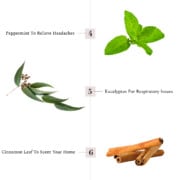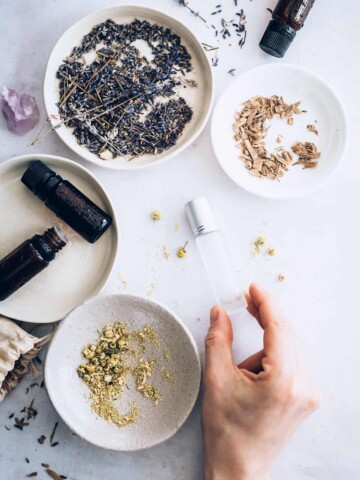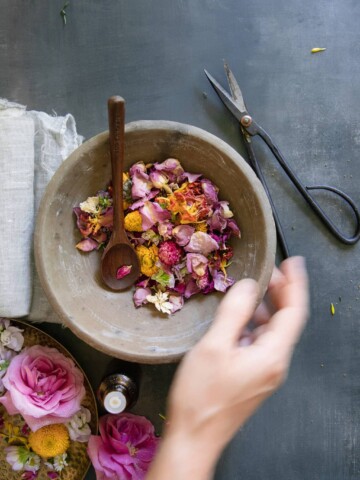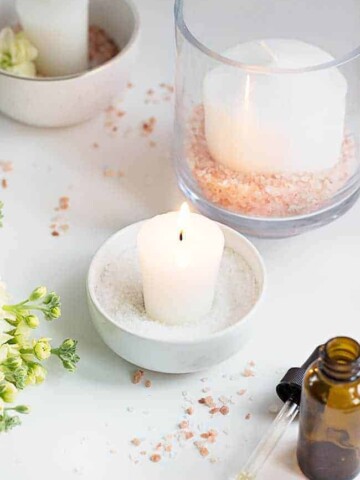Not sure what to diffuse? Whether you're looking to relax, boost your mood, improve air quality, or enhance focus, there's likely an essential oil that can help. Below are nine of the best essential oils for diffusers along with some simple blend recipes to use them in.
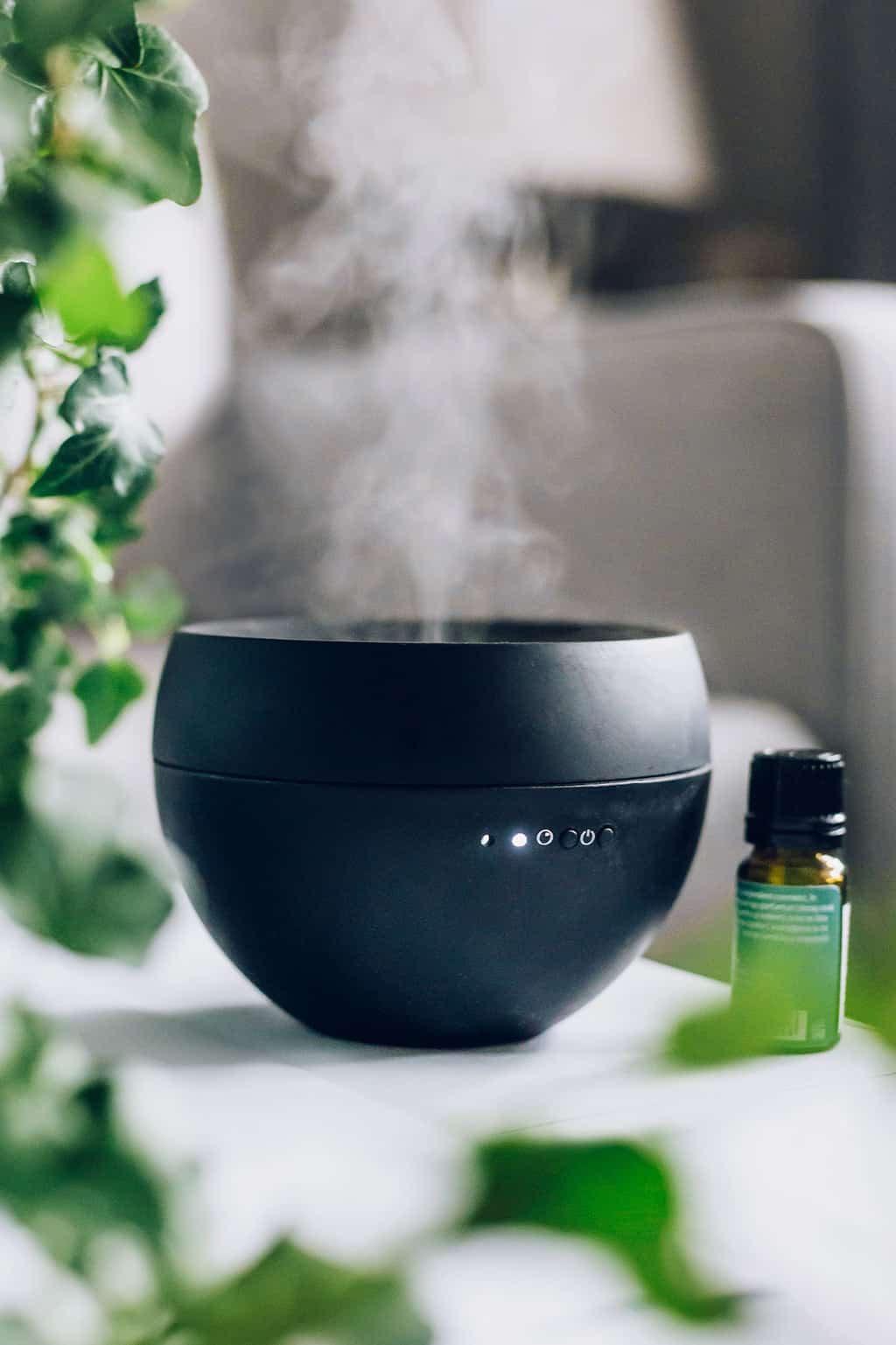
My trusty favorite diffusers have served me well over the years. Currently, I own five diffusers that I stash in different places around the house so that I can bring them out at a moment’s notice.
I diffuse oils for SO many things. For instance, when my children are going through the dreaded insomnia phase, I break out their diffuser to use with sleep-promoting oils. Once in awhile, I use it for migraines [source]. Or, when someone is sick, I diffuse air-purifying and germ-fighting essential oils.
But sometimes, I just diffuse for the sheer pleasure of it. Often, I like to diffuse mood-boosting blends or even blends just to make the house smell nice.
Jump to:
- 5 Benefits of Essential Oil Diffusers
- The Best Essential Oils for Diffusers
- 1. Lavender To Relax
- 2. Oregano To Fight Germs
- 3. Citrus To Clear the Air and Boost Your Mood
- 4. Peppermint To Relieve Headaches
- 5. Eucalyptus For Respiratory Issues
- 6. Cinnamon Leaf To Scent Your Home
- 7. Rosemary For Focus
- 8. Ylang-Ylang To Set The Mood
- 9. Ginger For Nausea
- 8 More Diffuser Oil Blends To Try
- FAQ
5 Benefits of Essential Oil Diffusers
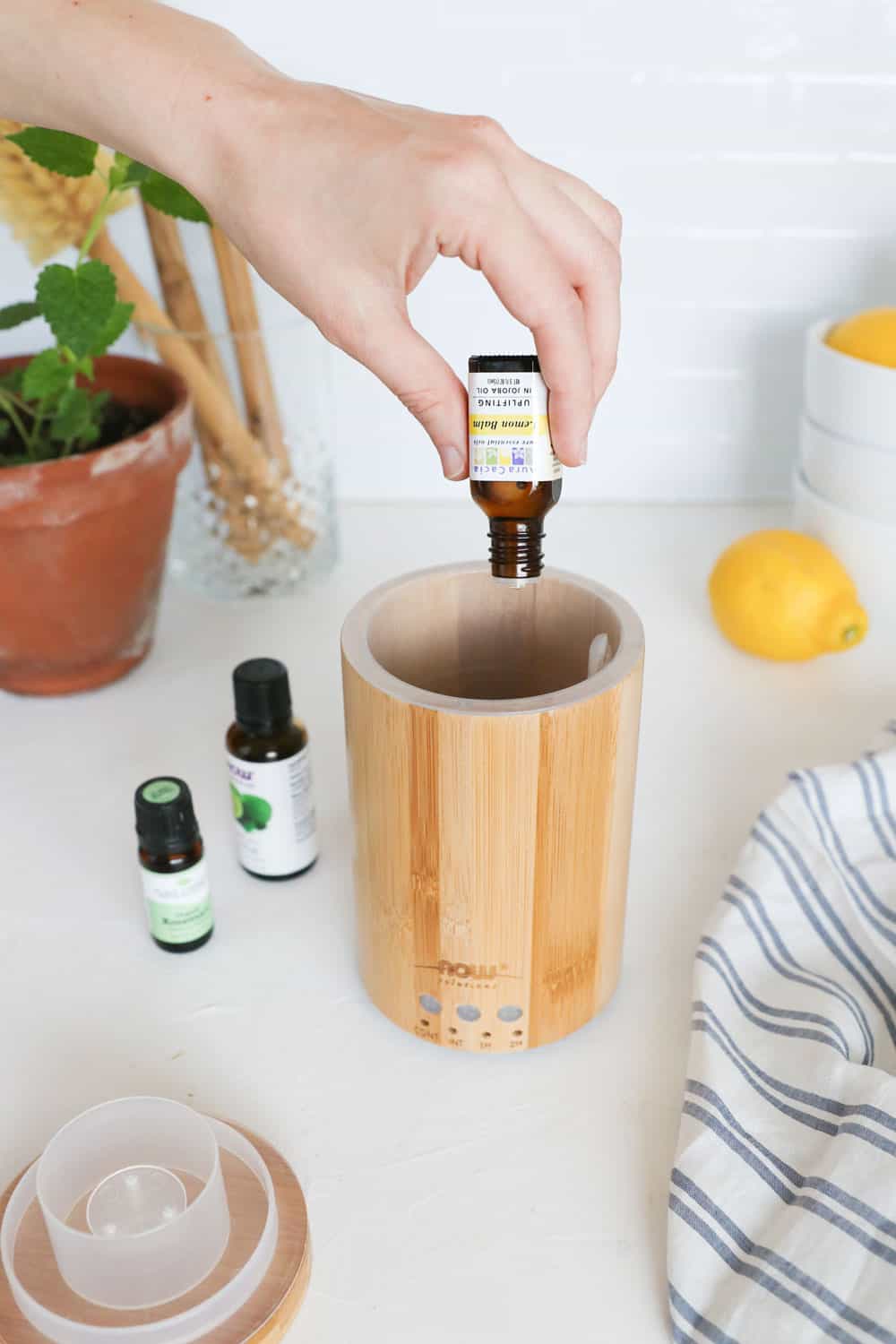
Diffusing essential oils can promote relaxation, improve sleep, boost mood, provide respiratory support, purify the air, and create a pleasant aroma in your living space.
1. Promote Rest and Relaxation
Many people start using essential oils and aromatherapy to help them with relaxation and stress relief. Certain essential oils evoke physical and emotional responses that can help ease the stressors of everyday life, and many oils have relaxing and sedating properties that can help you fall asleep more easily.
2. Support a Healthy Immune System
Essential oils are not only killing off viruses in the air, but they also give your immune system a boost. If you are using oils as a means to get better rest [source] and resist food cravings [source], that may help strengthen your immune system. Diffusing essential oils has also been shown to have antibacterial effects [source].
3. Boost Mood and Balance Emotions
The emotional center of your brain, the limbic system, is linked to your sense of smell. When you breathe in essential oil vapors, your olfactory bulb sends impulses to your brain [source], affecting heart rate, blood pressure, breathing, stress levels, memory, and hormones.
Does smelling lavender help calm you down, too [source]? That's because our brain creates a link between scent and our memories and emotions!
When you smell the oil vapors, you are opening up those links. Those scents can trigger emotional responses, which result in emotional stability, calmness, or relaxation. You can also make new connections and memories with the new oils you use.
4. Support a Healthy Respiratory System
Our family is personally affected by respiratory issues, so we know how important it is to have a healthy respiratory system, which supplies oxygen to your entire body. The respiratory system has many different components (sinuses, nasal cavity, lungs, trachea, diaphragm—to name a few), and we want each of those parts working properly!
Many essential oils can help fight germs in the respiratory tract [source] and promote healthy breathing throughout the year.
5. Create Fresher Air
Take a quick look at your air freshener that smells like apples and cinnamon. Are apples and cinnamon the only ingredients listed? Probably not. Plus, most of these products just mask odors instead of eliminating them.
You can’t beat essential oils for a natural air freshener. Vaporized essential oils actually alter the odor molecule structure rather than just covering them up.
Diffusing essential oils into a room is a great way to combat airborne pathogens, too. When you diffuse essential oils into a room, you have a way to knock out and destroy bacteria in the air [source].
The Best Essential Oils for Diffusers
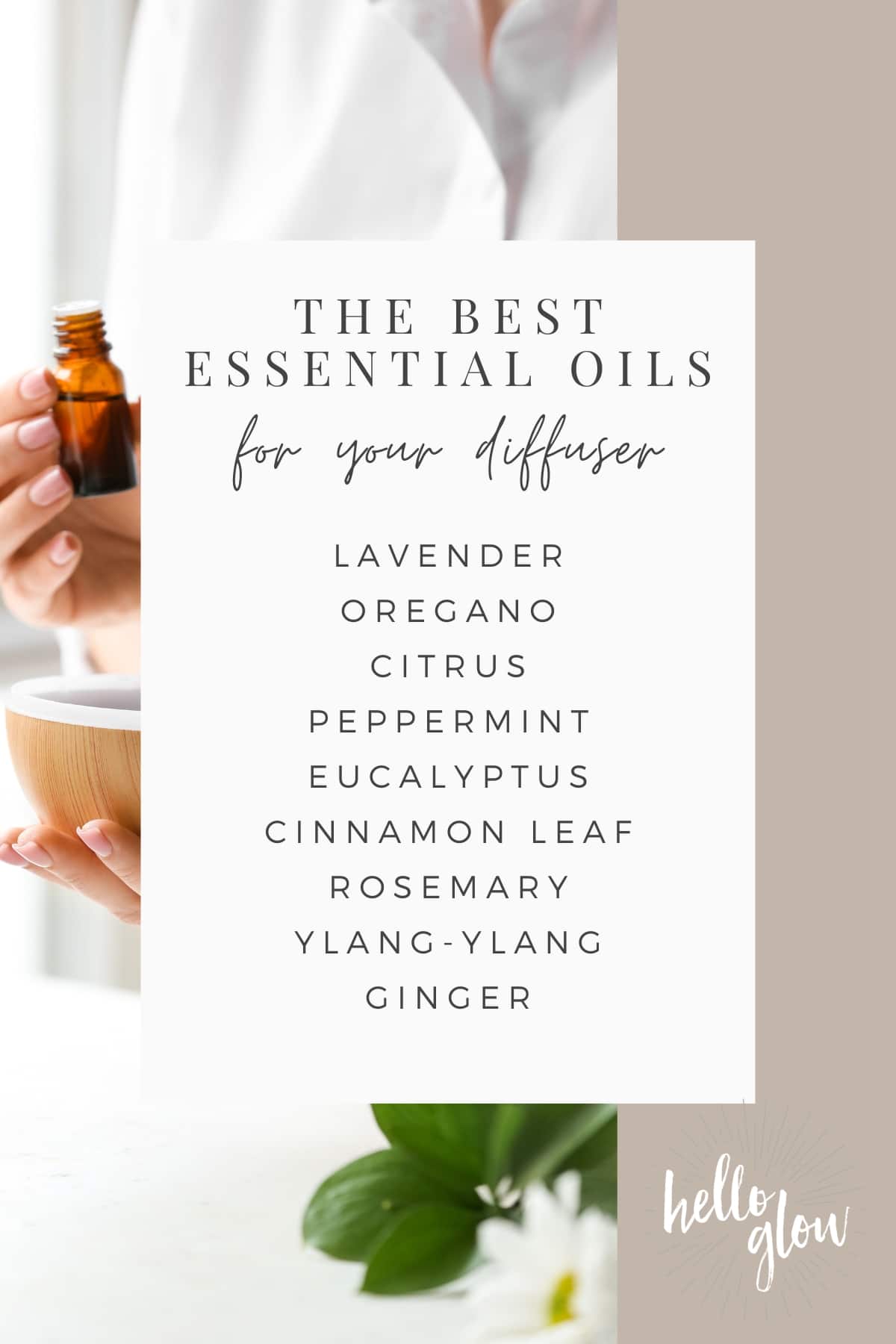
What are the best essential oils to diffuse? Essential oils are so versatile, but each of these essential oils has been chosen for specific reasons.
Most of them have multiple therapeutic properties and can be used in numerous situations, but some are included simply because of their potency or particular characteristics.
That’s the beauty of using essential oils—their versatility makes them easily adaptable to suit your individual needs!
1. Lavender To Relax
No doubt you’ve heard lavender’s many praises sung repeatedly. But the fact is, it’s an amazing essential oil. It’s especially beneficial for diffusion because it’s just so darn versatile.
Lavender is known for its calming properties [source]. So it’s a great idea to diffuse lavender essential oil to promote relaxation and help you sleep.
Additionally, due to its antibacterial [source] and antiseptic properties, it’s also useful with illness to fight germs. And it is effective in relieving migraine headaches [source].
Lavender, along with frankincense, sandalwood, and chamomile, are some of the best essential oils to use in a diffuser to ease anxiety and reduce stress.
For a simple, relaxing blend diffuse:
- 5 drops lavender
- 3 drops sweet orange
- 2 drops cedarwood
To unwind before bedtime try 5 drops lavender, 4 drops chamomile, 1 drop ylang ylang
To relax and lift your mood, mix 4 drops lavender, 3 drops bergamot, 3 drops frankincense.
2. Oregano To Fight Germs
Oregano is an especially potent essential oil. It’s also REALLY great at fighting germs and infection. It’s antibacterial [source], antiviral, and antifungal, making it a no-brainer when trying to prevent illness.
A drop or two added to a blend can boost the germ-fighting properties of any blend. Just remember, it does have a strong aroma that can easily overpower if not used in small amounts.
And, as it is one of the more potent essential oils, Essential Oil Safety recommends it not be used around young children or pregnant or breastfeeding mothers. You can leave it out and use tea tree oil instead.
For a potent germ-fighting blend diffuse:
- 3 drops cinnamon leaf
- 3 drops eucalyptus
- 2 drops tea tree
- 2 drops oregano
To purify the air, blend 2 drops oregano, 4 drops tea tree, 4 drops lemon.
Refresh air after sickness with 3 drops oregano, 4 drops eucalyptus, 2 drops peppermint.
3. Citrus To Clear the Air and Boost Your Mood
Really, just about any citrus oil can be included on this list. Due to their fresh, fruity aromas, citrus oils are wonderful to include in mood-boosting diffusion blends.
In addition, quite a few of them, like lemon [source], lime, and grapefruit, contain strong antimicrobial properties as well [source]. This makes them especially beneficial when diffused in air-purifying and germ-fighting blends.
Some citrus oils, like sweet orange and bergamot, even have calming [source] and sedating properties and are often used to reduce stress.
For a bright, mood-lifting blend, diffuse:
For a cheerful and energizing blend, try 5 drops lemon, 3 drops sweet orange, 3 drops grapefruit.
Clear unwanted odors from your space with 4 drops bergamot, 4 drops lime, 2 drops lemon.
4. Peppermint To Relieve Headaches
Peppermint makes the cut due to its versatility. It’s an excellent air freshener and purifier, but it’s also beneficial when fighting off germs. It is traditionally used when dealing with digestive issues and headaches [source].
If you’ve got a headache, pair it with lavender and diffuse away. If you are struggling with nausea, pair it with ginger [source].
Feeling a bit sluggish and unable to concentrate? Diffuse it near your work area and let its refreshing scent naturally perk you up [source]!
For a headache blend, diffuse:
- 3 drops peppermint
- 3 drops lavender
- 2 drops eucalyptus
- 2 drops frankincense
Relax and relieve headache pain with 4 drops peppermint, 3 drops lavender, 3 drops frankincense.
Enhance focus and clarity while alleviating headache symptoms with 3 drops peppermint, 3 drops eucalyptus, 3 drops rosemary.
5. Eucalyptus For Respiratory Issues
Eucalyptus is one of my favorite oils to diffuse. It's commonly used with respiratory illness, making it one of the best essential oils to diffuse when dealing with coughs, colds, and congestion.
Due to its fresh scent, eucalyptus helps with fatigue [source] and is considered to be stimulating to the mind, so it would be a good choice to diffuse if you’re looking for a mental boost as well. And truthfully, it’s just really good at freshening the air due to its antibacterial and antiviral properties [source].
For a respiratory blend, diffuse:
- 3 drops eucalyptus
- 3 drops lemon
- 2 drops peppermint
- 2 drops cedarwood
Clear the sinuses with 4 drops eucalyptus, 4 drops peppermint, 2 drops tea tree.
Soothe respiratory discomfort and purify the air with 4 drops eucalyptus, 3 drops lavender, 3 drops lemon.
6. Cinnamon Leaf To Scent Your Home
I find myself using cinnamon leaf more and more in my diffuser blends. It contains antibacterial [source], antiviral, and antifungal [source] properties and can be beneficial when there is an illness in the house. I usually diffuse it when somebody is sick, but I also really just love the smell of it.
I like to include it in blends to freshen and purify the air, and during the holidays I diffuse it often. When combined with orange and pine oils, it creates a lovely holiday blend that can be enjoyed all year!
For a festive holiday blend, diffuse:
- 5 drops sweet orange
- 3 drops pine
- 2 drops cinnamon leaf
For a warm, inviting blend try 3 drops cinnamon leaf, 4 drops orange, 2 drops clove.
Create a comforting spicy scent with 3 drops cinnamon leaf, 3 drops ginger, 3 drops cardamom.
7. Rosemary For Focus
The invigorating aroma of rosemary is particularly beneficial during study sessions or work projects as it can give your alertness and memory a boost. The compound 1,8-cineole, found in rosemary oil, has been associated with improved cognitive performance and mood.
When you need to be more productive at home or work, create a rosemary blend to give you focus and energy. The refreshing aroma will purify the air at the same time.
For an effective focus blend, try combining:
- 3 drops rosemary
- 2 drops lemon
- 1 drop peppermint
To maintain concentration over longer periods, mix 4 drops rosemary with 3 drops lavender and 3 drops frankincense.
For a boost in creativity and mood, mix 3 drops rosemary with 4 drops bergamot and 2 drops eucalyptus.
8. Ylang-Ylang To Set The Mood
The rich, floral scent of ylang-ylang is not only deeply relaxing but also known to have aphrodisiac properties. The essential oil helps balance emotions, release tension, and bring harmonious well-being—all great supports in setting a romantic atmosphere.
Floral oils are some of the best essential oils to use in diffuser blends to enhance sensuality and emotional connections. Just be warned that a little of ylang ylang and other floral oils goes a long way and can easily overpower other scents so use sparingly.
For a romantic diffusion blend, combine:
- 2 drops ylang ylang
- 5 drops sandalwood
- 1 drop rose
For a sweet and earthy aroma, mix 3 drops ylang ylang, 4 drops bergamot, and 3 drops patchouli.
To ease stress and enhance closeness, mix 3 drops ylang ylang with 6 drops lavender.
9. Ginger For Nausea
Ginger is naturally antibacterial and antiseptic. It has potent antimicrobial properties that make it useful when dealing with illness, and it's often used for pain relief. It's a warming oil that is also considered an effective remedy for stomach and digestive issues.
It's frequently used for nausea [source], travel sickness, constipation, and digestive issues in general [source]. When paired with other nausea-reducing oils, it can create a pleasant-smelling and effective way to deal with those pesky stomach troubles!
For an antinausea blend, diffuse:
- 4 drops ginger
- 3 drops spearmint
- 3 drops sweet orange
Soothe the stomach and calm the mind with 3 drops ginger, 2 drops peppermint, 4 drops lavender.
Aid digestion with 3 drops ginger, 3 drops spearmint, 3 drops lemon.
8 More Diffuser Oil Blends To Try
Here are a few great blends to try in your cold-air diffuser! Drop recommendations are for a diffuser, but you could easily make a mixture to store in a roller or dropper bottle. Try using 1–2 drops at a time in your diffuser jewelry.
Wake Me Up Combo - lemon and peppermint (2–4 drops of each)
Odor Attacker - tea tree, lemon, orange, and frankincense (1–2 drops of each). Another good combo to try is rosemary, citronella, tea tree, lemon, and cinnamon.
Happy Clean Combo - lemon, orange, and grapefruit (2 drops of each)
Just Breathe - bergamot, ylang ylang, patchouli (2 drops of each), or try a combo of frankincense and bergamot (2–4 drops of each)
Sweet Dreams Combo - chamomile, bergamot, clary sage (2 drops of each)
Concentration & Memory Blend - peppermint and orange (2–3 drops of each), or try 4 drops rosemary, 6 drops lemon, and 4 drops cypress for mental clarity
Respiratory Blend - 1 drop each of rosemary, clove, eucalyptus, and cinnamon
Immune System Support - lemon, lime, peppermint, rosemary, and eucalyptus radiata (1–2 drops each)
FAQ
It's generally recommended to diffuse essential oils for 30-60 minutes at a time. Continuous, long-term exposure without breaks can lead to over-saturation and potential adverse reactions, especially in sensitive individuals or pets.
The amount of essential oil depends on the size of the room and the type of diffuser. A general guideline is to use 3-5 drops per 100 mL of water, but this can vary. Refer to your diffuser's manual for specific recommendations.
Yes, it's generally safe to diffuse essential oils daily as long as you follow safety guidelines, such as using appropriate amounts, taking breaks between sessions, and ensuring the oils are not harmful to any household members or pets.
Yes, blending essential oils can create unique aromas and enhance therapeutic benefits. However, it's important to research which oils blend well together and to ensure the combination is safe for all household members.
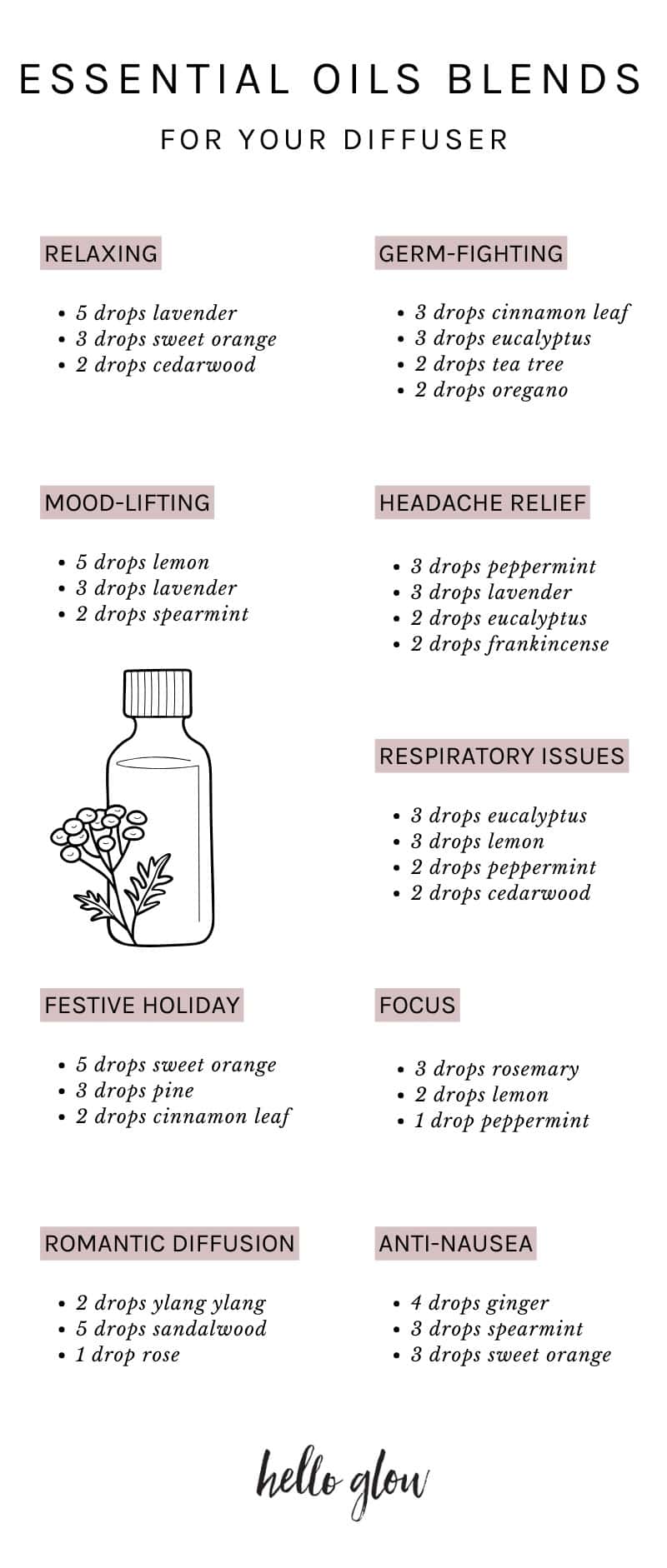
This article was medically reviewed by Dr. Gina Jansheski, a licensed, board-certified physician who has been practicing for more than 20 years. Learn more about Hello Glow's medical reviewers here. As always, this is not personal medical advice and we recommend that you talk with your doctor.
257
